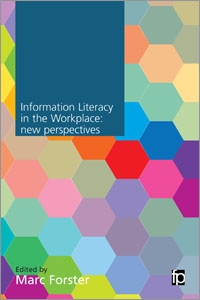
Primary tabs
You don't need to be an ALA Member to purchase from the ALA Store, but you'll be asked to create an online account/profile during the checkout to proceed. This Web Account is for both Members and non-Members. Note that your ALA Member discount will be applied at the final step of the checkout process.
If you are Tax-Exempt, please verify that your account is currently set up as exempt before placing your order, as our new fulfillment center will need current documentation. Learn how to verify here.
- Description
- Table of Contents
- About the author
- Reviews
In today's information-driven workplace, the modern professional must know when research evidence or relevant legal, business, personal or other information is required, how to find it, how to critique it and how to integrate it into their existing knowledge base. To fail to do so may result in defective and unethical practice which could have devastating consequences for clients or employers. This demands highly focused and complex information searching, assessment and critiquing skills.
This book, through a range of perspectives from the personal to the organizational, shows how information literacy (IL) is essential to the contemporary workplace and to an understanding of how the modern professional experiences, and could potentially experience, the contemporary information environment. Using an evidence-based approach, Information Literacy in the Workplace demonstrates several aspects of IL's presence and role in the contemporary workplace, including IL's role in assuring competent practice, its value to employers as a return on investment, and its function as an ethical safeguard in the duty and responsibilities professionals have to clients, students and employers.
Chapters are contributed by a range of international experts, including Christine Bruce, Bonnie Cheuk and Annemaree Lloyd, with a foreword from Jane Secker. Content covered includes:
- how the range of Information Literacy experiences in a profession or workplace can be investigated
- a discussion of the value and impact of IL in the workplace
- how IL is experienced remotely, beyond workplace boundaries
- IL's role in professional development
- IL's role in organizational learning and knowledge creation
- how IL in the workplace can be developed in an evidence-based way
- how to unlock and create value using IL in the workplace.
Figures and tables
Contributors
Foreword – Jane Secker
1. Information Literacy and the workplace: new concepts, new perspectives? – Marc Forster
2. How is Information Literacy experienced in the workplace? – Marc Forster
3. Information Literacy and the personal dimension: team players, empowered clients and career development – Marc Forster
4. From transaction to transformation: organizational learning and knowledge creation experience within Informed Systems – Mary M. Somerville and Christine S. Bruce
5. Virtuality at work: an enabler of professional Information Literacy – Elham Sayyad Abdi
6. Determining the value of Information Literacy for employers – Stéphane Goldstein and Andrew Whitworth
7. Information Literacy's role in workplace competence, ‘best practice' and the ethics of professional obligation – Marc Forster
The development of Information Literacy in the workplace
8. Learning within for beyond: exploring a workplace Information Literacy design – Annemaree Lloyd
9. Developing information professional competencesin disciplinary domains: a challenge for higher education – Stephen Roberts
10. The ‘hidden' value of Information Literacy in the workplacecontext: how to unlock and create value – Bonnie Cheuk
11. The ‘Workplace Experience Framework' and evidence-based Information Literacy education – Marc Forster
References
Index
Marc Forster
Dr. Marc Forster is a librarian at the University of West London, UK, looking after the needs of the College of Nursing, Midwifery and Healthcare. His research interests include Information Literacy's role in learning and in the performance of the professional role.
"Forster makes a strong convincing point that it is incumbent upon all knowledge workers to go beyond mere competence in the workplace and aim for best practice ... Students, librarians, professionals and organizations would do well to consider and explore the increasingly driven imperative that IL skills will be needed in a connected, ethical, constantly evolving future, and this book provides a platform to start on this road."
— Journal of the Australian Library and Information Association
"This book offers a fresh perspective and suggests ways to reframe IL so that it is acknowledged throughout a workplace as relevant and valuable. It provides ideas for information professionals on how to develop their own and their colleagues’ IL in a workplace context, as well as on how to support students in their transition to work ... This book is relevant to information professionals who support workplaces, to academic librarians who support student and staff IL, and also to those who are studying IL."
— Journal of Information Literacy


